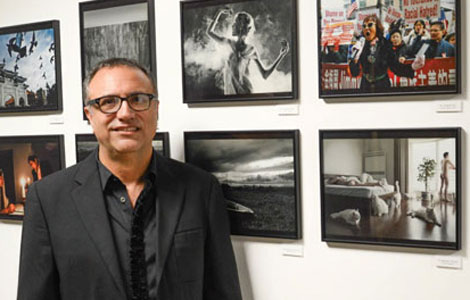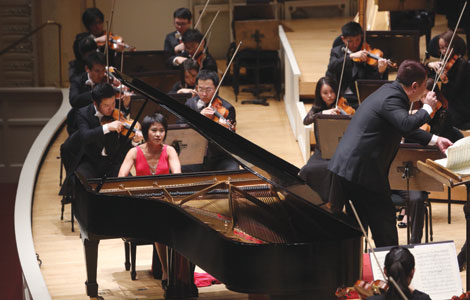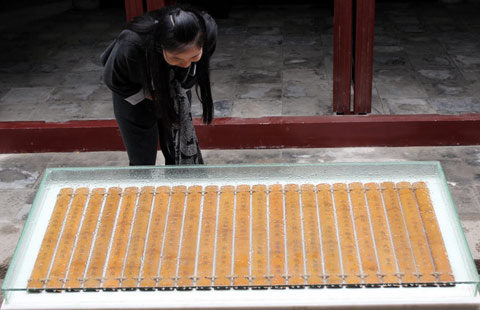In the eye of the outbreak
Updated: 2014-11-01 07:40
By Liu Zhihua(China Daily)
|
||||||||
Despite her daughter's concerns, Beijing doctor Yao Gaiqi traveled to West Africa to help local health workers contain the spread of Ebola.
On the afternoon of Aug 11, Yao Gaiqi received a phone call from her bosses at Peking University Third Hospital, asking her to prepare to go to West Africa. Her mission? To help fight the Ebola outbreak.
"I'm not a passionate traveler, and West Africa had seemed very far away from my life," says Yao, 50, director of the hospital's intensive care unit. "I would be lying if I said I was not afraid. But it is my job to treat patients, and I must go if I'm selected."
As a specialist at the top general hospital in China, Yao had led a number of response teams to treat victims of earthquakes and terrorist attacks. But this was a different kind of assignment.
Yao agreed to go and told her teenage daughter that she was traveling to Birmingham in the United Kingdom for training, fearing the girl would worry too much about her safety if she told her the truth. "I could not imagine how she would react if I told her I was going to West Africa," Yao says.
On Sept 20, as many countries closed their borders with Guinea over fears that the Ebola outbreak would spread, Yao and two other doctors from China left for Conakry, capital of Guinea. China began sending relief materials and medical experts to West Africa after the deadly outbreak began in March.
The group received a warm welcome from the Chinese embassy to Guinea and China-Guinea Friendship Hospital, which was built by China. They joined a 10-member medical team from Beijing Friendship Hospital that had been sent in August to help prevent diseases from spreading.
The original team was assigned to work in the country for two years, and Yao was charged with leading the group. In August, before the team arrived in the country, the Guinean government announced a nationwide state of emergency as part of a series of measures aimed at containing the disease. Conakry has a high prevalence of diseases, such as malaria and AIDS/HIV, due to poor sanitation and a lack of medical institutions.
Yao's team lived at the China-Guinea Friendship Hospital, and their main tasks included providing training on disease control and prevention to local medical staff and people working in Chinese enterprises. They attended regular meetings at the World Health Organization's Sub-regional Ebola Outbreak Coordination Center, which is based in Conakry, and relayed information about the outbreak back to China.
Yao's team also treated patients at the hospital in Conakry, which before the outbreak was home to more than 20,000 Chinese. More than half have since left, she says.
The group works 24-hour shifts every five days, treating hundreds of patients. Many are unsure whether they have Ebola or a different infectious disease. In the early stages, patients with Ebola show no signs of the disease, Yao says.
The living conditions of local people are poor, and mosquitoes and fruit bats help spread disease. The fruit bat is believed to be the natural host of Ebola virus. "I used a lot of anti-mosquito spray. Chinese people there even told me they dared not have a haircut or see a dentist," Yao says.
"Now that I think of it, it was quite dangerous, living in an epidemic-stricken area and meeting so many people."
Yao says she messaged her daughter every day, assuring her that she was safe. "I'm very grateful for the time difference between Beijing and Conakry/Birmingham," she says. "Otherwise, I would have had to engage in conversation with my daughter, and would not have been able to successfully hide the truth from her."
She also didn't tell her daughter about the pain in her right leg she developed while in Guinea. Her right leg became swollen and ached, and Yao feared it could be a sign of thrombus, a type of blood clot.
"I took medicines I had brought from Beijing, and I was lucky not to have severe thrombus or a stroke there," Yao says.
Yao and her two fellow doctors returned to Beijing on Oct 12. Yang Dongping, a publicity official with Yao's hospital, told China Daily she has declined many media interview requests because she doesn't want her daughter to know where she really went.
Yao says she has followed news reports about the Ebola outbreak closely since returning to Beijing. "I now feel connected with people I met there, and I hope they will be all right," Yao said.
Contact the writer at liuzhihua@chinadaily.com.cn
|
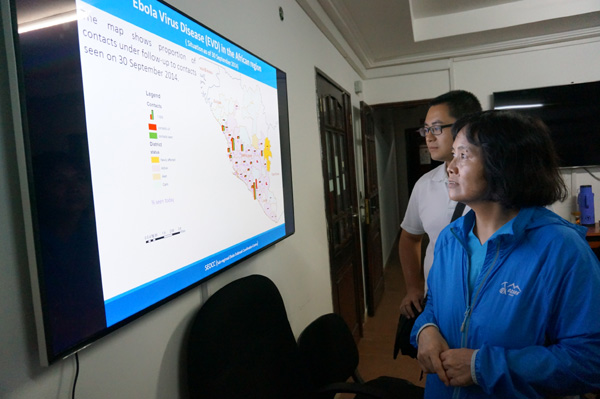 Yao's team worked at the World Health Organization's Sub-regional Ebola Outbreak Coordination Center, which is based in Conakry, Provided to China Daily |
Most Viewed
Editor's Picks
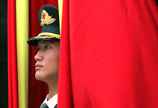
|

|

|

|

|

|
Today's Top News
Mahjong expanding 'to every corner of the world'
Chinese culture scoring points abroad with mahjong
Marathons: why they do it
Wanted: 500,000 pilots for China aviation
Shaping Asia-Pacific's future
Xi stresses CPC's absolute leadership over army
Foreign TV shows online will need permission
Mass Ebola outbreak 'is unlikely'
US Weekly

|

|

